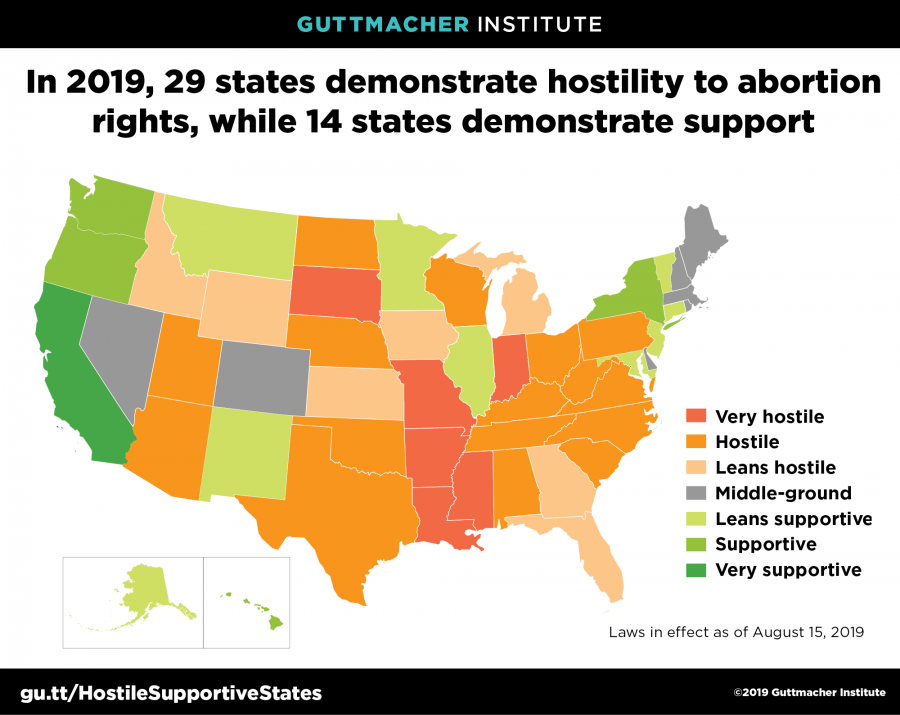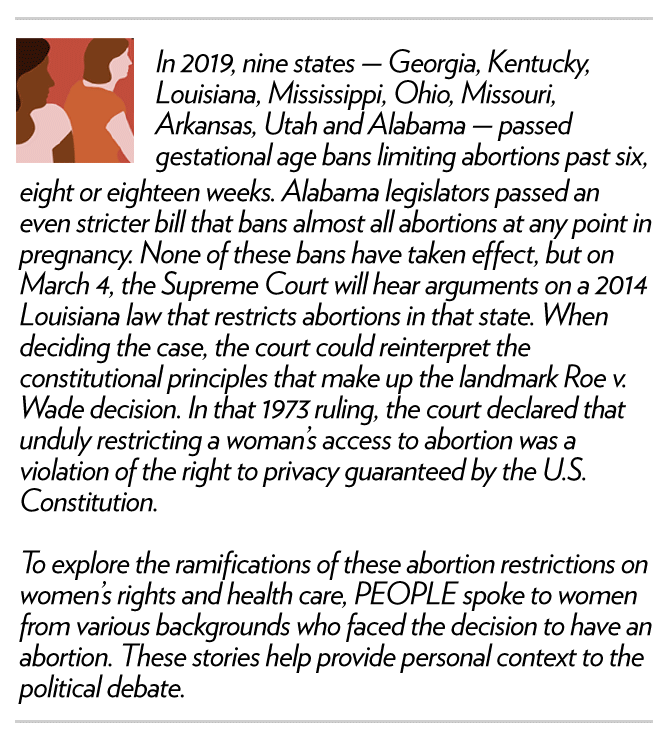I Thought Abortion Restrictions Were a Reasonable Compromise — Until I Needed One at 32 Weeks
Ten weeks into my first pregnancy, I had a miscarriage. It was really devastating. My doctor said, ‘You know, this happens all the time and there’s no reason for you to not try again when you’re ready.’
So, a month later, I was pregnant again. We made it through the first trimester with no problems. Then we started to get some concerning blood test results and my pregnancy was elevated to be high risk. I was transferred to a high risk maternal fetal medicine obstetrician in New York City and was highly monitored, getting checks every couple of weeks, and as the weeks went on the complications racked up.
Over time, serious muscular issues came to light, like bilateral club feet, and the hands were always clenched tightly in every ultrasound. There was very little fetal movement, my amniotic fluid was really really high and most concerning, the fetus was not growing. These were things that my doctors couldn’t have known until the third trimester. Eventually our doctor determined the fetus was not swallowing. Swallowing is how a developing baby practices breathing — no swallowing, no breathing, that’s it.
We asked our doctor what would happen if I carried to term, and he said I would likely give birth to a baby who would choke for a few moments and then die. We got that information at 30 weeks.
At that point, there were really no good options for us. Taking all of the data and information that we had collected on this pregnancy over the eight months, we tried to make the best decision that we could live with. We wanted to alleviate suffering the best as we could and stay true to our own morals and values.
Everyone was really worried about my health too. Because of a previous brain surgery I’d had, my doctors were worried I could go into spontaneous labor. The original plan was for me to have a scheduled C-section, but it’s an invasive abdominal surgery with real risks. I didn’t want to have a C-section for a baby that wouldn’t live. My doctors were also concerned about my ability to have future children. That’s when we decided to end the pregnancy. It was also when we also learned that in New York State at the time, abortions after 24 weeks were illegal. There was only an exception if the mother’s life was at risk, which meant basically I’d have to be dying on the table to get an abortion after 24 weeks in New York.
After eight months of being cared for by all these various specialists — we saw so many really smart healthcare providers — in the end, all that mattered was what a bunch of politicians wrote into law in 1970, before women could have credit cards. They didn’t know me or my situation, nevermind anything about maternal fetal medicine. But ultimately they were the deciders on whether or not I could get abortion care in my own state.
At that point we were referred to a provider in Colorado where they currently allow patients and providers to make these decisions. We faxed all of our scans to the doctor there. Together, our high risk OBs, my brain surgeon in New York and the doctor in Colorado all worked to decide not only what the best course of care was best for my health, but how to get around these laws.
They landed on a care plan which involved us flying to Colorado to get a shot to induce fetal demise, which is the part that was illegal in New York. Then the same night, we had to fly back to New York because the clinic in Colorado was not a hospital, and due to my previous medical conditions, the doctor in Colorado thought I should labor and deliver in a hospital. So my husband and I flew to Colorado, got the shot and flew back so I could deliver a stillbirth in a hospital, all in 36 hours.

The part of the procedure that was in Colorado cost $10 thousand and we don’t have that kind of money, so my mom took it out of her retirement fund so we could pay for it. That’s why it’s frustrating when people [in the abortion debate] say there’s this person who just ‘changes her mind’ about having a baby at 40 weeks; you can’t even do that in this country. There’s no one who will do that for you. Also, this person who seeks that? Show her to me. She’s a myth based on seriously flawed ideas about who women are and how we make decisions. I could introduce you to thousands of patients who needed abortions later in pregnancy because they found out new critical information or faced barriers meant to deny them from getting their abortions as early as they would have wanted.
I think before all this happened, if you would have asked me if there should be some restrictions on abortion, I would have said yes. It sounded to me like a compromise, like ‘who can’t get an abortion before 24 weeks? Who can’t get it together before then?’ That seems like plenty of time, right? But I was just really ignorant; I didn’t know why people would need to get an abortion after that. And now, after what we went through, what I used to see as compromise, I now see as discrimination because some people can afford to get around these restrictions and many people can’t. And listen, I understand how people can feel uncomfortable about abortions later in pregnancy. I think of myself, the self “before” and I truly understand the conflict. But now I would ask myself how valuable was my discomfort? Was it worth limiting or even denying healthcare to people I don’t know, whose lives and circumstances I could never understand?
After my abortion, we started to understand the reality of the problem, and we wanted to help. So we started to work to change the New York state law. A bill passed in 2019 to bring our state law in line with the baseline protections of Roe v. Wade. So in New York now, there are added exceptions to our 24 week abortion limit when there are threats to a pregnant person’s health and in cases of fetal non–viability. There are still patients in New York getting on planes for abortion care because they do not meet these added exceptions, though their pregnancies pose real threats to their lives.
None of the early complications in my pregnancy were game-over information for us. We thought we would have a baby who would require special care, who might be in the NICU. We had an appointment with a pediatric orthopedist to figure out casts or braces for our baby if he was born with clubfeet. That felt very manageable for us, so we had never discussed ending the pregnancy earlier. We didn’t get the information [that the baby would not survive] until we were over an invisible legal line we didn’t know existed.
After my abortion I realized that between my two pregnancies, I had been pregnant for over 40 weeks, the amount of time most women are pregnant and deliver a healthy baby. It was heartbreaking.
Eventually I did get pregnant again and was terrified the whole time. We would go to appointments and they would say ‘everything looks great,’ and I would be done in five minutes and say, ‘are you sure?’ because I was so used to appointments always taking an hour. We were never sure our daughter was going to show up until she did. Pregnancy can be very complicated and each is unique. I am one person who had three wildly different pregnancy outcomes. Ultimately I am lucky because I was able to overcome barriers to get the care I needed. I just want that for everybody.
Erika and Garin are now organizing later abortion patients to educate the public about the need for access to abortion throughout pregnancy at PatientForward.org.
As told to Sheila Cosgrove Baylis


 Yahoo News
Yahoo News 
